June 5, 2025 | 05:04 GMT +7
June 5, 2025 | 05:04 GMT +7
Hotline: 0913.378.918
June 5, 2025 | 05:04 GMT +7
Hotline: 0913.378.918
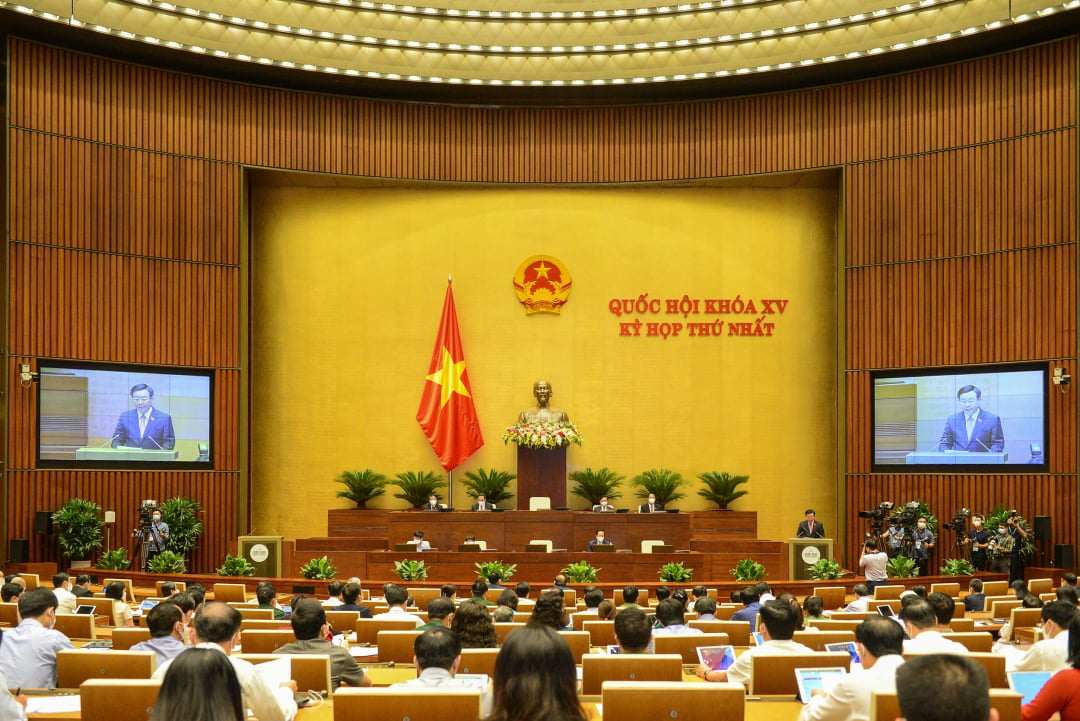
A working day at National Assembly Hall in the morning of July 27.
In the morning of July 27, the National Assembly (NA) hold a discussion at the NA Hall about the investment policy on the National Target Program on building new rural areas in the 2021-2025 period.
Vice Chairman of the National Assembly Nguyen Duc Hai said earlier in July 23, 2021, the National Assembly listened to proposals of the Government on the investment policy and report on examination of the Economic Committee.
At the same time, the NA spent time on discussing in groups about this issue with 156 opinions. The Secretary General of the NA summarized and reported the results to the NA deputies.
Initial opinions were received to prepare an explanatory report and draft resolution to be submitted to the NA for approval in the morning of July 28.
At the discussion, Mai Van Hai, member of Thanh Hoa Provincial National Assembly Delegation emphasized the need to continue implementing the goal of building new-style rural area sustainably , improving the material and spiritual life of the people, especially promoting cultural identity, preserving the beauty of the countryside.
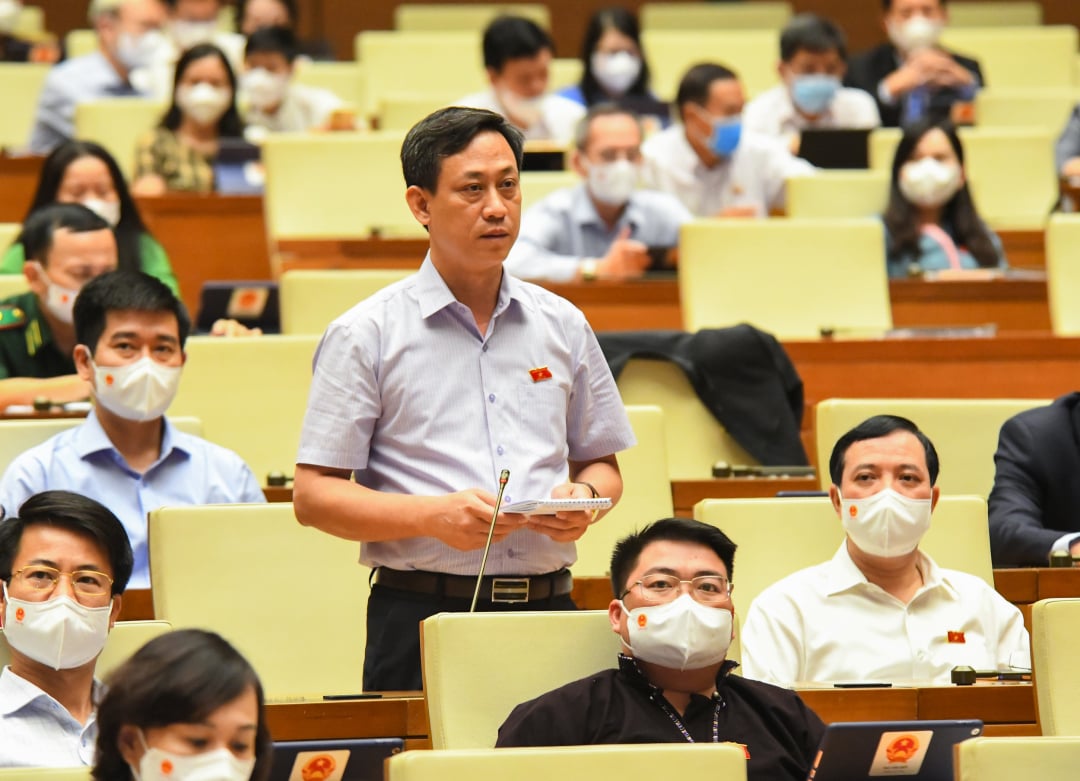
Mai Van Hai – Member of Thanh Hoa Provincial National Assembly Delegation discusses at the NA Hall in the morning of July 27.
As regards striving for at least 60% of villages, hamlets in extremely difficult communes fulfilling new rural area building task, Mai Van Hai suggested the Government should review to have a practical fundamental for setting realistic goals.
In addition, the Government should stipulate framework criteria for building villages, hamlets. As for specific criteria, they should be detailed by the People's Committees of the provinces. Then, it will create unity throughout the country.
“Criteria for national planning, provincial planning, district planning, especially new rural communes need to be one step ahead to create important resources for building new-style rural areas," said Mr. Hai.
At the same time, it’s necessary to pay attention to solutions on public resource mobilization. Because people are the subject of this Program.
In regard to budgetary mechanism for supporting localities, member of Thanh Hoa Provincial National Assembly Delegation assessed: “The Government’s proposed budget for the National Target Program on building new rural areas is only equivalent to 62% of the budgetary allocation in the 2016-2020 period. In my opinion, the amount is quite small.”
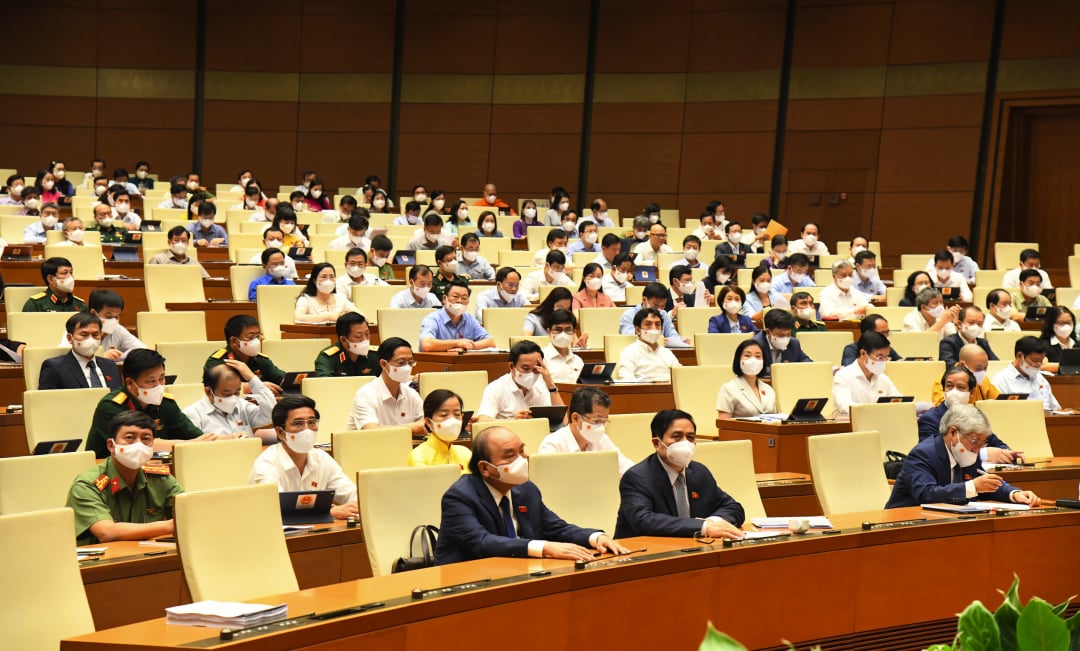
Delegates attend the discussion at the NA Hall in the morning of July 27.
He said that the Government should review to prioritize support for localities that still have to balance their budget from the Central by 60% or more, because in the coming years, State budget collection will be difficult due to the Covid-19 pandemic. Moreover, the communes and districts building new rural areas in the next phase will face more difficulties than in the past.
Nguyen Thi Thu Nguyet, member of Dak Lak Provincial National Assembly Delegation shared after ten years of implementing new rural area building, with the dynamic and drastic direction of the Government, with the involvement of the whole political system and a sense of responsibility of people from all walks of life, the Program has achieved very important result that the Party and State leaders considered “great, comprehensive and historic”.
This result has breathed new life into people’s lives, creating new look for rural areas across the country, building trust in the renewal of the Party and the National Assembly as well as the operation of the Government.
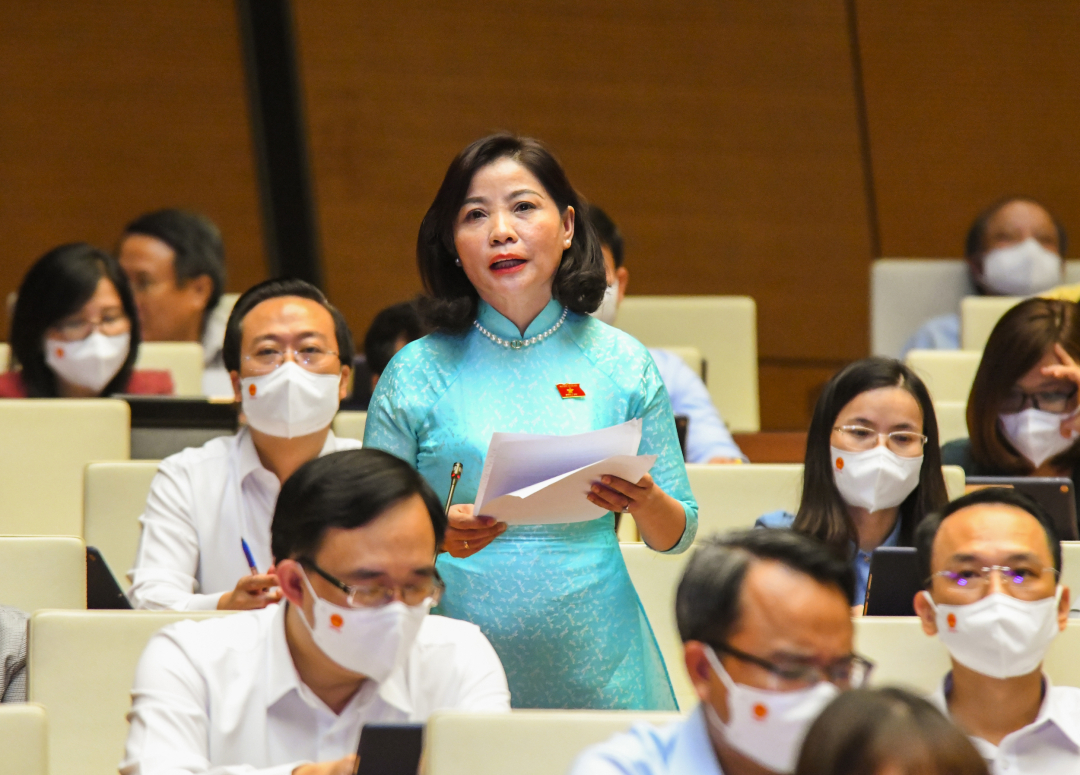
Nguyen Thi Thu Nguyet, member of Dak Lak Provincial National Assembly Delegation discusses at the NA Hall in the morning of July 27.
However, from the realities of the province, Nguyen Thi Thu Nguyet expressed: “I’m very worried about the proportion of counterpart funding local budget at about VND 156.7 trillion (accounting for 6.4% of the total resources) for implementing the Program in the context of the current complicated development of the Covid-19 pandemic while we don’t know when it is over and localities are taking advantages of all resources to ensure social security.
With regard to budgetary mechanism from the Central budget for supporting localities in the next phase, Nguyet suggested when developing and promulgating principles, criteria, quota for funding the Government should take into account the characteristics of each region such as natural area, population, poverty rate, percentage of ethnic minorities, especially paying much attention to the mountainous areas, the Central Highland to allocate funds. The aim is to help residents in the difficult areas access to resources to reach the goals set by the Program.
In addition, it’s necessary to consider financial support for the implementations of the OCOP program in the Circular No.08 issued by the Ministry of Finance in the way of extending the sphere of support to include support for packaging, equipment, factory expansion. Facilitating entities to participate in the process of restructuring of the agricultural sector and building new-style rural areas in a sustainable way.
Earlier, Tran Chi Cuong, member of Da Nang Provincial National Assembly Delegation said: According to the statistics in 2020, the poverty rate in rural areas was 7.1% while in the urban areas, the rate was 1.1%.
This proves that the poverty rate in rural areas is very high. Therefore, it’s necessary to create close interaction between the National Target Programs on Sustainable Poverty Reduction and New Rural Area Building in order to avoid overlap and low efficiency. Because to achieve sustainable development, the Program on building new-style rural area must reach a goal of poverty reduction and poverty reduction will contribute to rural development.
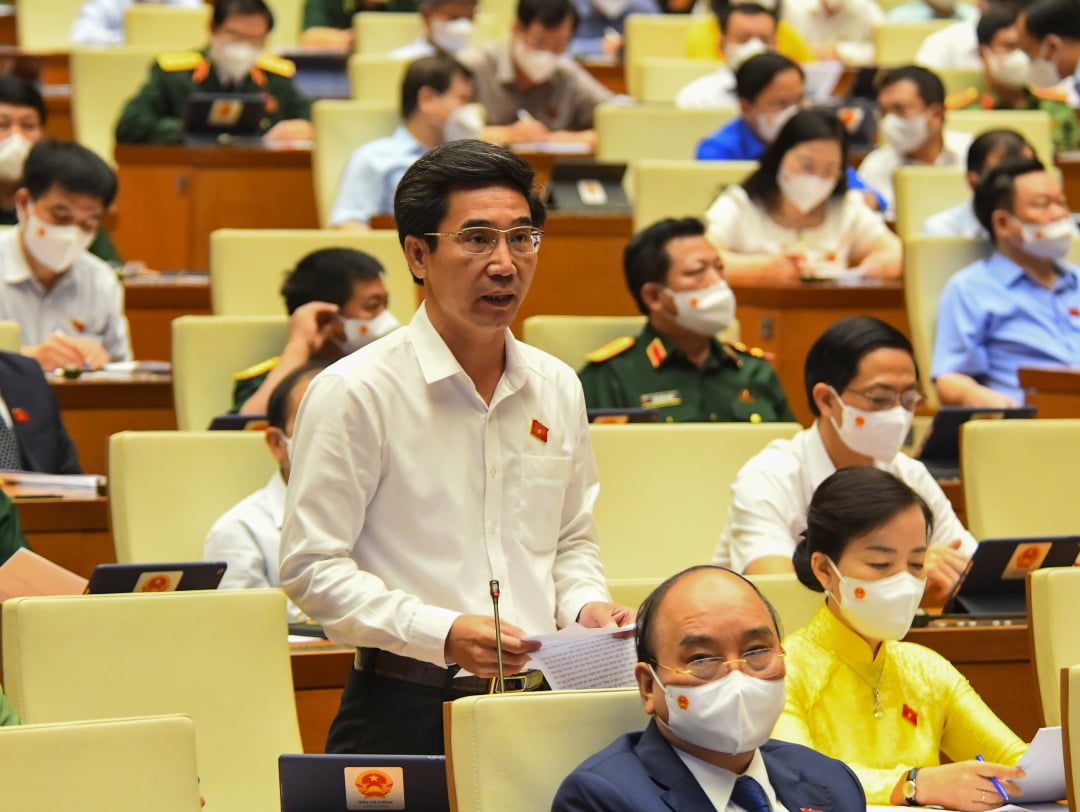
Tran Chi Cuong, member of Da Nang provincial National Assembly Delegation discusses at the NA Hall.
At the same time in the current period, especially with the impact of the Covid-19 pandemic, it’s necessary to access the needs by entities, localities and regions to have the arrangement and investment priorities with focus so that the Program gains the highest efficiency, overcoming investment spread.
Secondly, according to Tran Chi Cuong, in the context the economy is facing many challenges, economic activities of businesses and people are very difficult which has great impact on the capital mobilization as planned.
In addition, the capital investment for the three national target programs in the medium-term public investment plan for the 2021-2025 period is VND100 trillion of which the programs on building new rural areas and sustainable poverty reduction account for VND50 trillion or 1.75% of total capital investment.
While the two programs set very high goals and implement many projects such as reducing the percentage of poor and near-poor households by a half, investing in socio-economic infrastructures for 70 poor districts, 200 extremely difficult communes, housing assistance for poor and near-poor households, 80% of communes, 50% of districts meeting new rural standards and the programs will be deployed nationwide.
“Thus, in my opinion, the investment level is not commensurate with the goals set by the program. Therefore, I suggest that it’s necessary to calculate and allocate more resources from the State budget to ensure that the goals set by the Program will be achieved,” Cuong emphasized.
Luu Ba Mac, member of Lang Son provincial National Assembly Delegation said that the science and technology program for building new rural areas has contributed to promoting researches, technology applications and transfers and innovations in agricultural production. And in many localities, this program has changed people's perception and traditional habits.
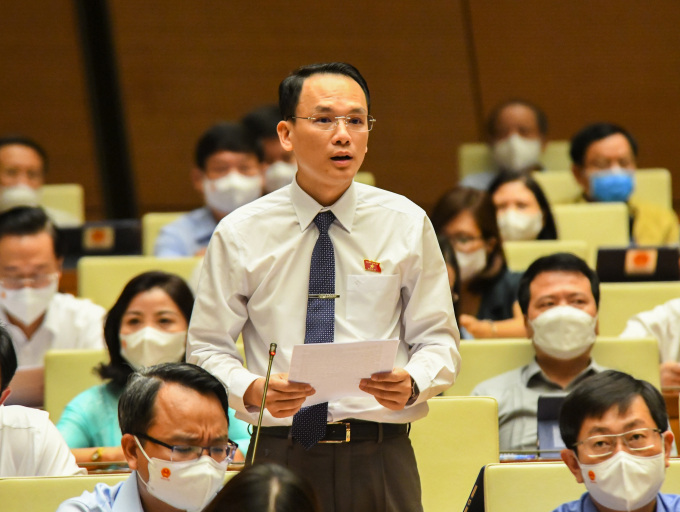
Luu Ba Mac, member of Lang Son provincial National Assembly Delegation discusses at the NA Hall.
Many key agro-forestry products of localities have developed into intellectual products protected by copyright and put up for sale in the market, contributing to creating reputation, prestige, improving the productivity, quality and value of local products.
Many households have started to apply hi-tech, e-commerce and digital transformation to connect supply and demand, selling agro-forestry products and participating in the value chain.
Therefore, the Government should develop policies to support and attract businesses to directly participate in scientific researches, technological process as well as applying research results to the agricultural product chain.
Secondly, paying attention to the allocation of funds which must be increased year by year to implement the Science and Technology Program for building new-style rural areas. The aim is to create conditions to further improve the role and effectiveness of science and technology in new rural area building.

(VAN) VAAS and numerous Vietnamese enterprises have signed cooperation agreements with Japanese partners to promote agricultural technology and trade connectivity.
/2025/05/29/5625-12-214801_567.jpg)
(VAN) Provincial mergers in the Mekong Delta promise to streamline administration, expand inter-provincial raw material areas, and foster close linkages in agricultural value chains, benefiting both businesses and cooperatives.

(VAN) Merging Mekong Delta provinces contributes to the expansion of agricultural raw material areas, addressing previous constraints caused by provincial boundaries. Additionally, this expansion will reduce costs and strengthen linkages between businesses, cooperatives, and farmers.
/2025/05/29/1043-2-153730_145.jpg)
(VAN) The Government's policy to merge provincial-level administrative units opens up major opportunities for the Mekong Delta region to reshape its agricultural development strategy toward large-scale production, effective regional linkages, and sustainability.

(VAN) The mutual export of agrifood products between the European Union (EU) and the United Kingdom (UK) must occur again without certification, border controls or other red tape. This was agreed at the UK-EU summit.
/2025/05/22/5121-2-173645_677.jpg)
(VAN) NBSAP Tracker identifies strengths and areas for improvement in the National Biodiversity Strategy, based on each region’s priorities and capacities.

(VAN) The draft amendment to the Circular on rice export trading stipulates a periodic reporting regime for rice exporting enterprises.